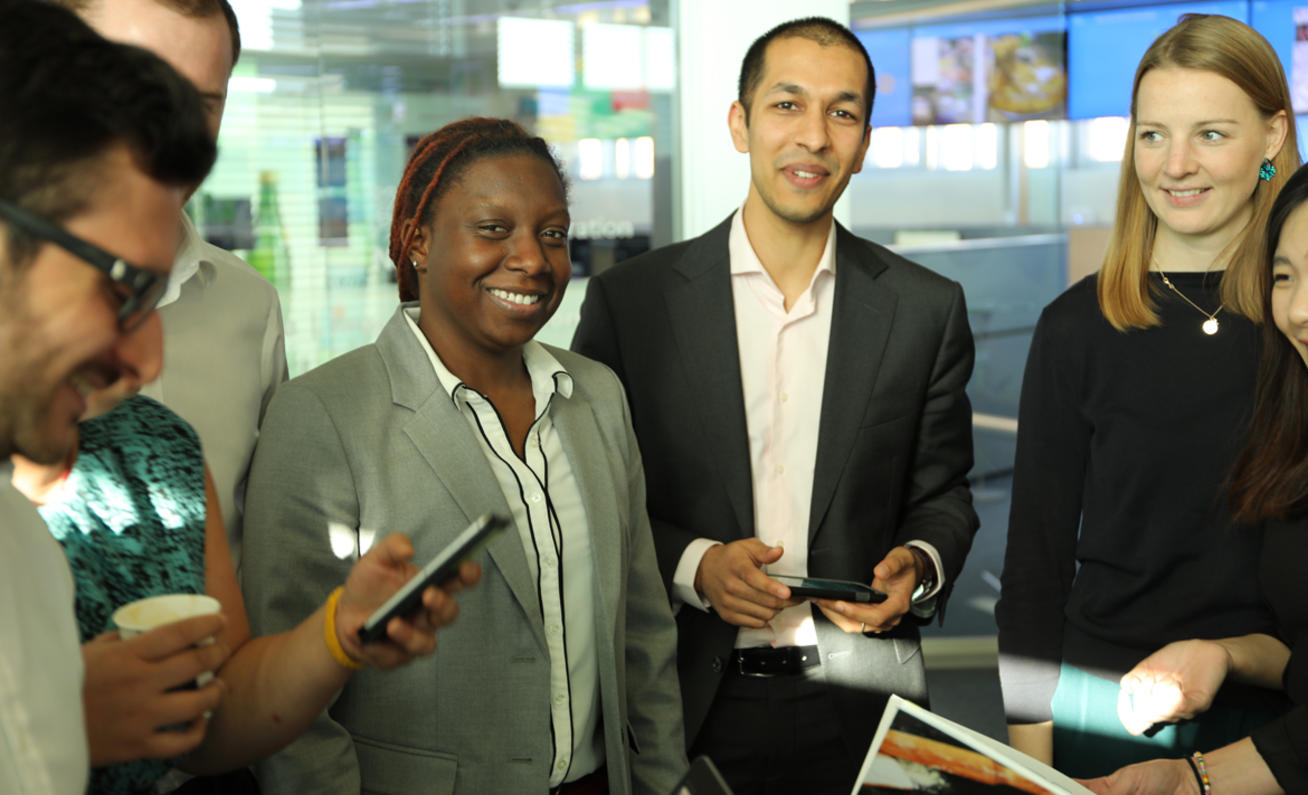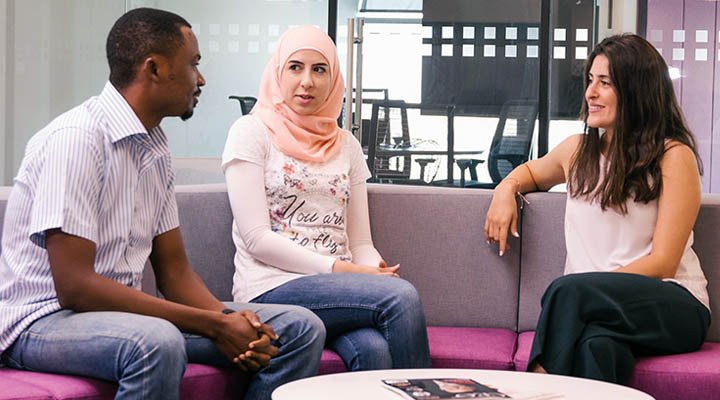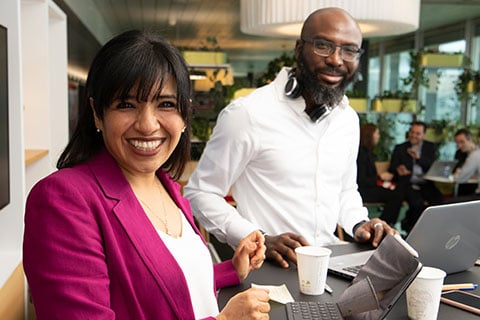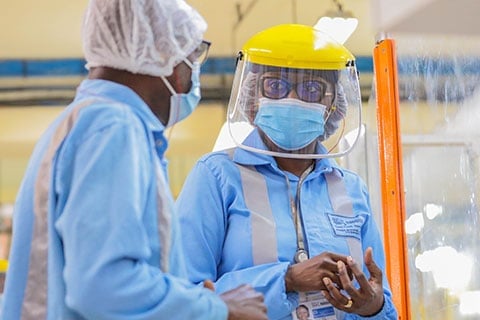Your First Day
Nine essential tips for your first day at work
You want to make a fantastic impression on your first day. Or at least, not to get too much stuff wrong. Believe it or not, it’s possible to thoroughly enjoy the experience, and build on it in the coming days, weeks and months. These tips will help you from that all-important day one.
1. You are what you wear
This might be just a case of checking what the dress code is, if there is one. You certainly want to be well presented as it’ll give you a confidence boost and help you impress all the new colleagues you’re going to be meeting. You’re representing yourself, your team and your new company, so be smart about it.
2. Get there early
This may sound basic, but work out which train or bus you need to catch, or where you can park. You don’t want to be caught offering excuses because you’re stuck in a traffic jam. Plan this part, and you’ll have one less thing to think about on the day.
3. Be confident
The workplace, especially if it’s your first, is almost designed to make you nervous. So just remember that everyone will feel the same on their first day doing new things among new people. You’re not expected to know it all, so just be friendly and start learning straight away.
4. Say hello
You’ll be introduced to people by your manager, but say hello if you meet other people too, whether you’re trying to use the coffee machine or you’ve got lost looking for the kitchen. Keep eye contact, smile and shake their hand. If you’ve prepared a little intro about yourself, use it to create a good first impression.
5. Ask questions
The more you ask early on, the better it is. Better still, try to remember most of it. A new job is the best time to question anything you don’t understand, and you’ll look great if you manage to pick a lot of it up. Try to get organised about that and other things from the start.
6. Remember what you said at the interview
They decided to hire you for a reason, so show that you can do that thing or be that person. (You should make a habit of keeping track of your contributions and accomplishments as well, so that you’re on top of how well you’ve done when performance review time comes around.)
7. Social media
Remember to update your title across your own social media platforms and to start following your new company and colleagues, if you’re not doing that already. As you meet new people, find them on Twitter or LinkedIn.
8. Develop some great relationships
Be nice, be friendly, be yourself – but always remember that the best working relationships are based on respect and trust, and respect and trust are based on actions and performance, not just on words. You may not have the contacts, the ability or the experience to do a lot right from the start, but you don’t need skills to be willing to help out and work hard.
9. Enjoy it! Really
Your first day can really be enjoyable if you plan what you can, and show you’re keen to learn. No one will expect you to be brilliant right out of the gate, so don’t stress about impressing absolutely everyone and remember to have fun.
Second Interview
Your Second Interview
What you should do if asked for a second interview
When you’re asked in for a second interview, it’s great news. Maybe your prospective employer needs sign-off on hiring you from someone higher up. Perhaps they want you to meet other members of the team to see how well you’d fit in. Or it could be that they’ve narrowed their selection down to just a few candidates and they want to decide which one to make an offer to. Whatever the reason, you’ll need to approach the second interview in a slightly different way to the first one.

Prepare
You need to start by looking at the points you made about your skills and experience during the first interview and try to identify what impressed them, and what they were less impressed by. In that way, you can give them more of the aspects of you that went down well and counter questions you felt you struggled with before.
If they’ve told you who the other interviewers are, there would be no harm in doing some research to find out how long they’ve been with the company, what they’ve done and what companies they worked for before.
Be confident
Second interviews are usually a bit more intense. There might be senior people present at the interview to ask you about your specialist skills. If that’s the case, be confident in talking about relevant parts of your background. Have a few examples ready to illustrate them all so that you can be more specific about your answers.
Tricky questions
Some interviewers ask them, others don’t. But you’d do well to be prepared for questions that apparently come from nowhere, as the panel may just want to see how you deal with it.
Don’t forget to ask your own questions
Second interviews are a better time to ask lots of questions as you can make them more relevant. Always ask hiring managers what they like about the company, what they think its goals are and how well it achieves them.
Fitting in
The second interview can often include meeting a few other people in your potential department or taking a short tour. The main reason for this is to make sure you're going to fit in. If you are a good fit, show it; but if you aren't, you probably wouldn't be happy working there, anyway. This is your chance to work out if you’d get on with your future team mates too and if you’d accept an offer.
Taking the offer
If they don’t make you an offer straight away, ask about the next step and how soon they might be able to give you a decision. But if they do, no matter how much you want to say yes, say thanks instead and ask for some time to consider. There’s no point spending the next few months of your life in a role that isn’t right for you, so you need to think about it.
Lastly
Don’t forget that all-important thank you note. Even if you don’t take this particular job, you’ve made new contacts who might remember you when they move on. And networking is valuable.
Body Language
Body Language
Seven body language tips that will help you get the job
So you’ve made it to the interview stage of the application process but are you ready to show your most positive, employable side? Body language plays a huge role in how we’re perceived – not slouching or crossing your arms are the obvious actions to avoid, but what about the less obvious signs? Making these small changes will certainly improve your chances of getting the job you applied for.

1. What are your hands saying?
Playing with your hair or tie, or clutching a bag or glass for longer than needed will make you look tense and nervous. Keep your palms up and open to show honesty and receptiveness and remember a firm handshake is the quickest way to establish rapport.
2. Look like you mean it
Making direct eye contact can be intimidating but the trick is to try and relax and listen. By focusing 100% on what your interviewer is saying you will naturally focus your eyes on theirs while showing interest and alertness.
3. Lean forward to listen
Leaning ever-so slightly forwards signifies you’re interested and focused.
4. Go slow
Think before replying to questions and try not to rush through your answers. If you need to take a moment, take it. Pause, think, reply – it’s important to be in control rather than letting yourself ramble.
5. Pick a positive role model
What media personalities do you think have particularly good body language? Check out their interviews and see if there’s anything you can learn. A winning smile is usually key!
6. Dress for the job you want
Before the interview find out the company’s dress code and match it. While over-dressing won’t harm your chances of getting the job, under-dressing almost certainly will.
7. Practice
Stand in front of a mirror and practice introducing yourself and answering a simple interview question such as ‘How do you see yourself fitting in our company?’. You’ll instantly realise when you need to increase and decrease your positive body language signals.
And if this is too much for you to remember another handy tip is to subtly imitate any positive body language signals your interviewer is making. If they’re smiling and relaxed, you should try to do the same. While good body language alone won’t get you the job you always wanted, it will definitely help in projecting a confident and professional image of yourself.
Interview Questions
Interview Questions
Five common interview questions and how to answer them
You made it! Your application made a great impression and now they want to meet you in person. It’s natural to be nervous, but you’ll find the more prepared you are, the less nervous you will be.

1. What do you know about our company?
Here the interviewer wants reassurance you've done your homework and have chosen to apply to them for a good reason. Before you go to any interview you need to know the size of the organisation, the scope of their range of products or services, the latest developments in the field, their history, goals, and public image – have they been in the news lately?
2. What motivates you?
Here it’s important to show you’re self-motivating. Think about any challenges you decided to take on, and how rewarding it was to achieve them. It could be that you organised an event and it went well – in that case you were motivated by desire to bring happiness to others and see a job well done.
3. What are your weaknesses?
This is definitely one that’s best to prepare for. Our advice? Pick a past weakness and show how you’ve taken steps to improve on it. An example would be if you’re not very strong at presenting. Admit to it, then say you practice at home in front of friends who video your efforts, and now you use the footage to improve.
4. Where do you see yourself in five years’ time?
As mentioned in Six things you should do before you start your job search it’s best to have thought about both short-term and long-term goals. Talk about the kind of career you envision for yourself and the steps you will need to get there, relating this back to the position you’re interviewing for.
5. Do you have any questions?
This often catches people off guard, and can even be asked once you’ve left the interview room. Be ready with a question that shows your enthusiasm and is specific to the role and/or organisation. A good question could be ‘What projects are the department working on at the moment?’
Work Experience
No work experience?
Six tips that will help you get a job without experience
Getting that first break in an industry or moving into a new field isn’t easy, especially when you are up against people with experience. It’s not impossible though, and with some hard work, a lot of ambition and confidence in yourself, it can happen. So we’ve put together some tips to help you plug those work experience gaps in your CV to get the job you want.

1. Know the industry
Knowledge is power, make your brain a sponge and soak up all the information, news and insight you can get into the industry and type of role you are aiming for. Passion goes a long way in demonstrating why you’re worth a shot.
2. Immerse yourself and have an opinion
Follow influential opinion formers in the industry, company and role you want to work in on Twitter and LinkedIn. Join relevant groups, follow blogs and sign up to forums. Post responses to questions and start to get your name and opinions out there – it will go a long way to showing your passion and knowledge on a range of subjects. Being able to confidently get your opinion across is a valuable skill in any role, but is key to demonstrating understanding and knowledge in the absence of solid experience.
3. Network your way to work
Research the path that people most commonly take to get that ideal job, connect with people through tools like LinkedIn and Twitter, and search an apply for internships, paid and unpaid to improve your network and gain some experience you can really build on.
4. Identify the skills you need
Make a list of all the skills that are valuable to (and listed in job ads for) the role you’re looking to get. Then list your own skills: technical and computer, communication, problem solving and research and managerial. Use examples of when you have demonstrated these skills successfully to tell a story of why you have what it takes to be given a go. For example, if you led a successful student campaign at university – include this in your CV. Or if you have held a volunteer position that has used these skills, include this too. Transferable skills are relevant and will demonstrate that you have the right qualities for the job.
5. Work for free
Join industry societies, volunteer and apply for internships and work experience in as many relevant places as you can, you’ll not only gain valuable experience, you’ll build a network and get a foot in the door. Once you’re in, be keen to take on responsibility, demonstrate your skills and lead projects or initiatives.
6. Ask for an interview
If you don’t ask, you don’t get. Be honest and seize the opportunity to show someone how much you deserve a chance. You have a much better chance of convincing a manager to hire you if you can tell them why you’re right and demonstrate through examples, why you have the relevant experience to do the job. Be confident in your skills and ability – any recruiter will respect your passion and effort and that’s half the battle.
Before You Start
Before You Start
Six things you should do before you begin your job search
When you’re looking for a job, maybe your first since leaving education, it can be a daunting prospect. Here are six things you need to think about before you even start sending off your CV to potential employers, so that you can begin to prepare for whatever opportunities come your way:

1. Set your goals
It’s good to think about what you want from your future career – both in the short and long term. Ask yourself:
- What do I enjoy doing?
- What am I good at?
- Where do my skills and knowledge lie?
- What characteristics of a job are important to me?
2. Clean up your CV
Every word on your CV needs to work hard:
- Spring clean your education section. If you're a graduate, your degree eclipses your school qualifications, which can be relegated to one line in most cases.
- Amend your CV for each application where that would help. Examine the job description and bring out your most relevant experience.
- Be short and to the point. Employers receive a lot of applications, so lots of detail isn’t necessary and won’t make you stand out from all the other applications.
3. The Google Test
What would an employer find if they ran a Google search on you? Have you set the right privacy settings to ensure your private and professional lives don’t mix?
4. Take a class or volunteer
Boost your employability by taking a class or volunteering. Both demonstrate a strong work ethic and that you’re keen to take the initiative. They’ll also add to your CV, providing talking points at your interview and potential networking opportunities too.
5. Follow brands and recruiters on social media
If you already use sites such as Facebook and Twitter, check out the pages of potential employers and follow them. You’ll not only receive news and job openings, but you will also learn more about their company culture. You’ll get a great idea of what the current job market is like and whether you would actually fit in with the culture of the company you’re applying to. So make sure you follow our Facebook page too!
6. Make connections
People are more likely to do business with individuals they know or people that are recommended. Let friends, family, old school or university classmates and professional contacts know that you’re looking for a job, and don’t be afraid to ask for their help in finding connections. Your profile on LinkedIn will help you build your contacts, but don’t forget that careers fairs, alumni events and conferences are great networking opportunities too.
LCP-404 Image component
Title
Subtitle
Body content

Search Jobs

Hundreds of jobs. Find the one that is right for you.
Diversity & Inclusion

Integral to our culture
Diversity & inclusion is our everyday reality. We respect and encourage uniqueness and potential regardless of your race, gender, culture, sexual orientation or disability.
Diversity in everyday life
We promote diversity & inclusion through our culture, our work in society and with innovation.
Culture
We build an inclusive culture leveraging the differences of our employees
Society
We're inclusive in the way we act and engage with society and stakeholders
Innovation
We think about the needs of diverse consumers and customers when we make and distribute our products
We recruit people who respect our values, we provide equal opportunities for all, and we protect everyone's privacy. We do not tolerate any form of harassment or discrimination. Our aim is to create workplaces where everyone feels included and able to bring their whole selves to work. This commitment starts at recruitment and continues to the end of the working relationship. Each of our markets has a diversity & inclusion action plan designed to provide equal opportunities for everyone to contribute, grow and and feel valued.
Taking action worldwide
Globally, Nestlé efforts are centered in four focus areas within diversity & inclusion: gender balance, people with disabilities, LGBT+ community and race & ethnicity.
Gender balance
We have been a member of the United Nations Global Compact since 2001. Through our Gender Balance Acceleration Plan, we aim to increase the proportion of women in our top 200 senior executive positions to 30% by 2022.
People with disabilities
Through membership of the ILO Global Business and Disability Network we promote the inclusion of people with disabilities across our global workforce. In 2020, we signed The Valuable 500 commitment to put disability inclusion on our leadership agenda.
LGBT+ community
We are committed to fostering an open and inclusive working environment where people feel comfortable and confident enough to be themselves. We do this by:
- Supporting the UN’s LGBTI Standards of Conduct for Business.
- Strengthening our inclusive workplace culture through workshops and e-learning for employees.
- Reinforcing our culture of respect with the Nestlé Policy against discrimination, violence, and harassment at work, and a confidential reporting system.
- Offering equal parental support benefits to same-sex and different-sex couples.
- Partnering with LGBT+ civil society groups to advocate for civil rights and workplace protections, such as l’Autre Cercle in France, Stonewall Diversity Champions in the UK, PARKS in Italy, and Pride Connection in Mexico, Colombia and Panama.
- Gaining recognition from non-profit organizations such as Swiss LGBTI label, a certification that recognizes open and LGBTI-inclusive corporate culture.
- Empowering employee engagement groups such as Proud@Nestlé to encourage dialogue and create a safe space for conversations around LGBT+ topics.
- Working to support our transgender employees. For example, through our transgender inclusion policy in the UK and in the U.S., we offer unlimited financial support for medical costs to employees undergoing gender transition. Also in Brazil, we offer legal and administrative support to transgender employees who are in the process of recertifying their name and gender.
Race and ethnicity
Nestlé has advanced racial and ethnic inclusion for a long time. Today, more than 85% of management committee positions in the countries we operate are held by local employees who are truly representative of the communities we serve. Nestlé was one of the founding members of the World Economic Forum's Partnering for Racial Justice in Business initiative.
Nestlé is a women-friendly workplace. Not only in providing nursery rooms, or giving generous parental leave, they also provide strong moral support, trust, and respect for a working woman like me to excel in my career. It’s reassuring to know that Nestlé wants to be there for both my ups and down.
At Nestlé, no day is ever the same as another! It's a really challenging environment, once you're inside, you're immersed in a continuous cycle of learning and growth. Another factor that makes Nestlé a great company is its culture. A culture based on respect and that encourages teamwork, leadership, diversity and inclusion.
I've never felt that I needed to hide who I am at Nestlé. On the contrary, my colleagues supported me with my coming out process. I believe that’s a true example of how our values based on respect are lived in our organization.
An inclusive organization
Nestlé draws strength, innovation and inspiration from the diversity of our people and communities. Learn more about our D&I initiatives:-
Supporting our people We work to ensure our employees are engaged, fairly remunerated and given the knowledge and skills to fulfill their potential.Read More
-
Employment and diversity Nestlé is promoting employment diversity as we aim to empower people, especially women and young people, through opportunities.Read More
-
Empowering women We are committed to enhancing gender balance in our workforce and empowering women across the entire value chain.Read More





















